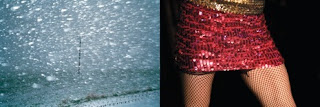> I’m not sure how many people will agree with me, but for me this is one of the best stories of the year, if not the best. On the other hand, it’s a “cancer” story, and we’re all sick of those, right? This one involves Bill, a truck driver (he delivers “treacle” to farms for their feed) in Scotland. His cancer has returned and he’s worried about how his wife Sall will take it and more worried about their daughter Caroline who works in Montreal and whom he hasn’t seen in a while. Sall and Caroline, it seems, have never gotten along well and as a result Sall has prevented Bill from accepting Caroline’s invitation to come visit. Bill cares about Sall but the love is gone and she isn’t really there for him, more worried about herself than about him, it seems. He just needs someone to talk to and he regrets turning down the offer of tea from one of the farmers he delivers to. Then he picks up a hitchhiker, a young man dressed as a woman who has obviously been beaten. Bill even tells him that the coming Christmas will be his last – he has needed to tell someone – but the boy’s problems are somehow bigger. The story borders on the over-sentimental, which is a risk with cancer stories, but it’s a satisfying read.
I’m not sure how many people will agree with me, but for me this is one of the best stories of the year, if not the best. On the other hand, it’s a “cancer” story, and we’re all sick of those, right? This one involves Bill, a truck driver (he delivers “treacle” to farms for their feed) in Scotland. His cancer has returned and he’s worried about how his wife Sall will take it and more worried about their daughter Caroline who works in Montreal and whom he hasn’t seen in a while. Sall and Caroline, it seems, have never gotten along well and as a result Sall has prevented Bill from accepting Caroline’s invitation to come visit. Bill cares about Sall but the love is gone and she isn’t really there for him, more worried about herself than about him, it seems. He just needs someone to talk to and he regrets turning down the offer of tea from one of the farmers he delivers to. Then he picks up a hitchhiker, a young man dressed as a woman who has obviously been beaten. Bill even tells him that the coming Christmas will be his last – he has needed to tell someone – but the boy’s problems are somehow bigger. The story borders on the over-sentimental, which is a risk with cancer stories, but it’s a satisfying read.
October 29, 2007: “The Cold Outside” by John Burnside

>Clifford, you begin your blog in a curiously defensive tone — “not sure how many will agree with me” and I wonder why since I haven’t seen such disclaimers before about stories you liked. I do disagree with you here. I find the piece unoriginal. Not because it’s a cancer story but I’ve just seen these basic symbolic and structural elements time and time again. It ends with the main character riding into the darkness and reflecting on the meaning of the atlas described by the hitchhiker. Now, in the final sentence the character has had a revelation and understood the deep symbolism of what the hitchhiker was saying. A very cliched ending. Having said that I enjoy greatly almost all short stories published in major literary magazines, and this was no exception. So yes, I agree that it was a satisfying read. Since you like to make comparative judgements about which stories are “one of the best” etc., I would say that Kate Walbert’s story “Playdate” is a much stronger piece than this one in my opinion.
Paul Epstein
>The defensiveness is for two reasons and apparently (since you don’t agree with my assessment) it was warranted! But the reasons are that this is a quiet, traditional story in most ways, and many people are just bored with that and also it’s a cancer story. I’ve heard editors and readers say often, “Oh, please, not another cancer story!” And I’m resistant to them myself. But obviously that’s not really what this story is about so it transcends that. As for your reasons for not liking the story, I hear you. There was enough freshness in it for me, though.
>I agree with you, Cliff. This is one of the better stories to appear in The New Yorker in a long while.